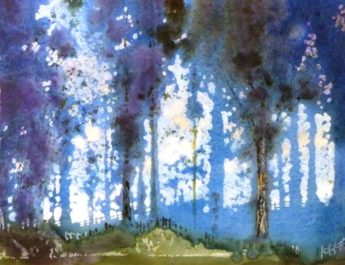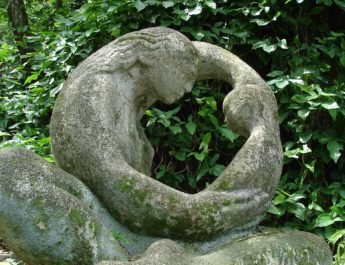Hosea 5:15-6:6
Proper 5A
5:15 I will returnA againB to my placeC
A “return” = halak. This is go, come, walk. It is walk literally and figuratively and includes people and animals. It can be used figuratively for one’s moral life – how we walk according to God’s way or against it. It can also refer to the walk of life as in the course one’s life takes, the choices we make, etc.
B “again” = shub. To turn back, return, turn away – literally or figuratively. Doesn’t necessarily imply going back to where you started from. This is also the root verb for the Hebrew word for repentance “teshubah.”
C “place” = maqom. From qum (to arise, stand, accomplish, establish, abide; rising against, getting up after being sick or asleep, arising from one state to another, becoming powerful, or rising for action; standing in a figurative sense). This is a standing, which is to say a spot or space a place. It can also refer to a locality or a physical/mental condition. HaMaqom is also a Jewish name for God – the place, i.e. the Omnipresent One.
until they acknowledge their guiltD and seekE my face.F
In their distressG they will beg my favor:H
D “acknowledge…guilt” = asham. This is to be guilty, suffer, be punished; to destroy, condemn, be desolate, or perish.
E “seek” = baqash. This is to seek, ask, desire, or request. It can be any kind of searching. It can also mean to worship or pray – implies a striving for.
F “face” = paneh. From panah (to turn, face, appear). This is face in a literal or figurative sense. It could be face, presence, anger, respect. It can also be used of God to indicate divine favor or presence.
G “distress” = tsar. From tsarar (to bind, restrict, narrow, be cramped, an adversary). Properly, this is a narrow or constricted place. Figuratively, it can be trouble, a pebble, an enemy, anguish, or distress.
H “beg…favor” = shachar. 12x in OT. From shachar (dawn, early light, or morning). This is to seek in a diligent or eager way. It is to look for early as someone who stays up for the morning watch to see at the dawn. Often used for seeking God or seeking good.
6:1 “Come,I let us returnJ to the Lord,K
I “come” = halak. Same as “return” in v5:15. See note A above.
J “return” = shub. Same as “again” in v5:15. See note B above.
K “Lord” = YHVH. From havah (to be, become) or hayah (to come to pass, become, be). This is the name of the God of Israel, the self-existent and eternal one, the tetragrammaton. This pronunciation has been lost to time so “Lord” is generally used in its place.
for it is he who has torn,L and he will healM us;
he has struck down,N and he will bind us up.O
L “torn” = taraph. This is to tear or pluck off into pieces, to rend or catch. It can also mean supply with food.
M “heal” = rapha. Properly, this is to repair by stitching – figuratively this means to heal or cure. It can also mean to make whole.
N “struck down” = nakah. This is to hit whether lightly or severely. It can be used in a literal or figurative sense. So, this could be beat, punish, give wounds, kill, or slaughter.
O “bind…up” = chabash. This is to wrap tightly or bind, to bandage, or heal. It can be to saddle an animal or wrap a turban. Figuratively, it can mean to stop or to govern.
2 After two daysP he will reviveQ us;
on the thirdR day he will raise us up,S
that we may liveT beforeU him.
P “days” = yom. Root may mean being hot. This is the day in a literal or figurative sense. It can also mean birth, age, daylight, continually or other references to time.
Q “revive” = chayah. This is to live or keep alive in a literal or figurative sense. So, it can be revive, nourish, or save.
R “third” = shelishi. From shalosh (three, fork, triad). This is third or one-third of something.
S “raise…up” = qum. Related to “place” in v5:15. See note C above.
T “live” = chayah. Same as “revive” in v6:2. See note Q above.
U “before” = paneh. Same as “face” in v5:15. See note F above.
3 Let us know,V let us press onW to know the Lord;
his appearingX is as sureY as the dawn;Z
V “know” = yada. This is to know, acknowledge, advise, answer, be aware, be acquainted with. Properly, this is to figure something out by seeing. It includes ideas of observation, recognition, and care about something. It can be used causatively for instruction, designation, and punishment.
W “press on” = radaph. This is to chase after, pursue, hunt, or persecute. It is running after someone or something, generally with hostile motives.
X “appearing” = motsa. From yatsa (to go or come out, bring forth, appear; to go out in a literal or figurative sense). This is going forth as an act or the site from which something goes forth. It could mean exiting a place or the place where one exits. It can also be a source or a produce. Specifically, it can be a spring or fountain, the dawn as the the rising of the sin, an export, gate mine, and so on.
Y “is…sure” = kun. Properly, this means in a perpendicular position. So, it is set up in a literal sense – establish, fix, fasten, prepare. In a figurative sense, it is certainty, to be firm, faithfulness, render sure or prosperous.
Z “dawn” = shachar. Related to “beg…favor” in v5:15. See note H above.
he will comeAA to us like the showers,BB
like the spring rainsCC that waterDD the earth.”EE
AA “come” = bo. This is to enter, come in, advance, fulfill, bring offerings, enter to worship, attack. It can also have a sexual connotation.
BB “showers” = geshem. Perhaps from gasham (to rain). This is rain, shower, or rainy. It can be used figuratively for blessing or for destruction.
CC “spring rains” = malqosh. 8x in OT. From the same as leqesh (later growth, spring crop); from laqash (to take everything, gathering the later crop). This is late or the spring rain. Can refer figuratively to eloquence.
DD “water” = yoreh. 3x in OT. From yarah (to throw, shoot, be stunned; to flow as water so figuratively to instruct or teach). This is sprinkling, early rain (in autumn).
EE “earth” = erets. Root may mean to be firm. This is earth, ground, field land, or country.
4 What shall I doFF with you, O Ephraim?GG
What shall I do with you, O Judah?HH
FF “do” = asah. This is to make, do, act, appoint, become in many senses.
GG “Ephraim” = Ephrayim. From the same as epher (ashes or dust – properly something strewn) OR from parah (to grow, increase, be fruitful in a literal or figurative sense). This is Ephraim, one of Joseph’s sons, his descendants, and their land.
HH “Judah” = Yehudah. Probably from yadah (to throw one’s hands into the air in a gesture of praise); from yad (hand). This is Judah, meaning “praised.”
Your loveII is like a morningJJ cloud,KK
like the dewLL that goes awayMM early.NN
II “love” = chesed. From chasad (being good, kind, merciful; may mean bowing one’s neck as is done in the presence of an equal for courtesy’s sake; so, if one in a superior position is treating you like an equal, that is what is captured here). This is favor, goodness, kindness, loving kindness, pity, reproach, or a good deed. When done by God to humanity, this is mercy/loving kindness. When done by humanity to God, it is piety.
JJ “morning” = boqer. From baqar (to seek, plow, break forth, admire, care for). This refers to the break of day. So it is dawn, early, morning, or morrow.
KK “cloud” = anan. May be from anan (cover, cloud over; figuratively, acting in a secret way, practicing magic or soothsaying). This is a cloud as something that covers the sky.
LL “dew” = tal. Perhaps from talal (to cover, roof, strew). This is dew or mist as something that covers plants.
MM “goes away” = halak. Same as “return” in v5:15. See note A above.
NN “early” = shakam. This is leaning one’s shoulder into a burden or load, whether a person or an animal. Thus, it meant starting or rising early.
5 ThereforeOO I have hewnPP them by the prophets;QQ
I have killedRR them by the wordsSS of my mouth,TT
OO “therefore” = ken. Related to “is…sure” in v6:3. Perhaps from kun (see note Y above). This is to set upright. Generally used figuratively to mean thus, so, afterwards, rightly so.
PP “hewn” = chatsab. This is to hew or cut material like wood or stone. It can also be to dig, quarry, split, or engrave.
QQ “prophets” = nabi. This is prophet, prophecy, speaker, or someone inspired.
RR “killed” = harag. This is to strike with deadly intent so it can be kill, destroy, murder, or put to death.
SS “words” = emer. From amar (to say, answer, challenge). This is something that is said – a word, saying, speech.
TT “mouth” = peh. This is mouth in a literal or figurative sense. So, more literally, it can be beak or jaws. More figuratively, it refers to speech, commands, or promises.
and my judgmentUU goes forthVV as the light.WW
UU “judgment” = mishpat. From shaphat (to judge, defend, pronounce judgment, condemn, govern). This is a verdict or formal sentence whether from humans or from God. It includes the act of judging as well as the place that judging takes place, the suit itself, and the penalty. Abstractly, this is justice, which includes the rights of the participants.
VV “goes forth” = yatsa. Related to “appearing” in v6:3. See note X above.
WW “light” = or. From or (to be or become light). This is light, sun, sunshine, dawn, or daylight. Figuratively, it can refer to light from instruction, light of a face (that is to say one that is cheerful or finds favor). It can refer to prosperity or salvation; a light that guides, a light eternal from Zion.
6 For I desireXX steadfast loveYY and not sacrifice,ZZ
XX “desire” = chaphets. Properly, this means inclined towards or bending to. Figuratively, it means to desire, delight in, or be pleased with.
YY “steadfast love” = chesed. Same as “love” in v6:4. See note II above.
ZZ “sacrifice” = zebach. From zabach (to kill, slay, offer; slaughtering an animal to offer as a sacrifice). This is a slaughter – literally of an animal. So, it implies the act or the animals used in sacrifice. Further, it can mean offering.
the knowledgeAAA of GodBBB rather than burnt offerings.CCC
AAA “knowledge” = daat. Related to “know” in v6:3. From yada (see note V above). This is knowledge, unawares, cunning, wittingly.
BBB “God” = Elohim.
CCC “burnt offerings” = olah. From alah (to go up, climb, approach, bring; to be high or actively climb; can be literal or figurative). This is a step, stairs, or some kind of ascent. It is also used for whole burnt offerings, being the offering in which the whole thing is burned and rises as smoke. Burnt offerings were the least common of the offerings: most were eaten, shared with the priest and the one bringing the offering.
Image credit: “Sunset Colors 2” – a sun shower at Muraste Nature Reserve in Estonia. Photo by Kristoffer Vaikla, 2015.




